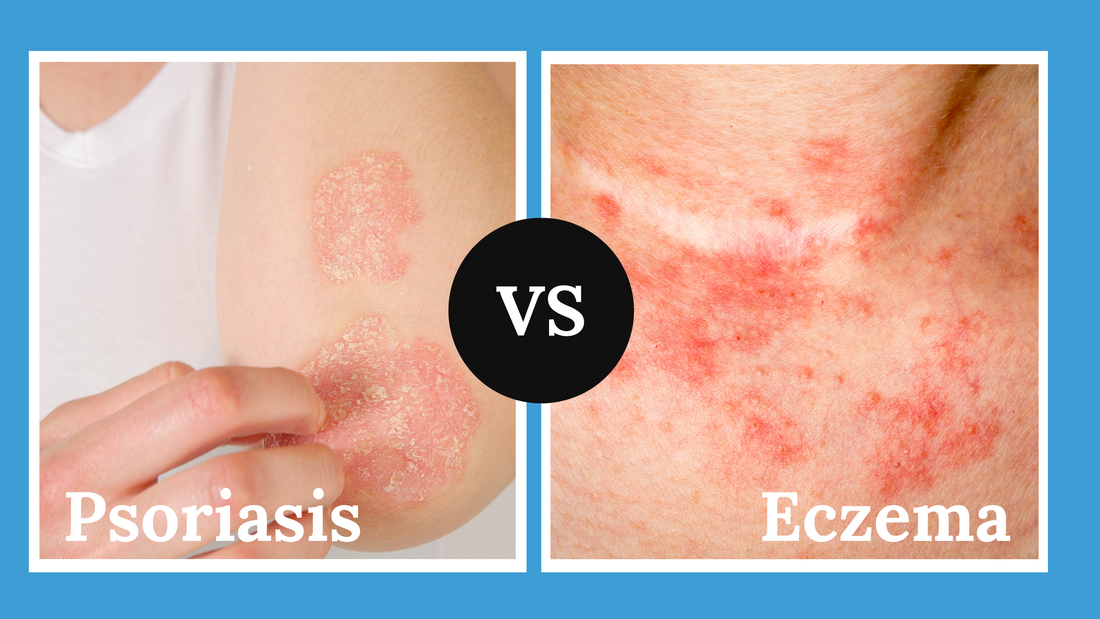If you've ever struggled to understand whether your red, inflamed skin is eczema or psoriasis, you're not alone. These two common conditions are often confused, but knowing the difference is crucial for effective treatment.
Let’s break down what sets them apart and help you find the right solution.
Comparing Eczema vs. Psoriasis: Appearances and Symptoms
Identifying the distinct characteristics of psoriasis and eczema is important for accurate diagnosis and treatment.
By recognizing the key differences, you can better manage your symptoms and improve your quality of life.
Eczema Symptoms
- Characterized by Red, inflamed, and itchy skin patches, eczema can appear anywhere on your body.
- The skin becomes dry, cracked, or has a leathery texture over time with small, raised bumps or oozing blisters.
- Common areas affected: face, hands, feet, inside elbows, and behind knees
Psoriasis Symptoms
- Psoriasis is characterized by Red, scaly, and flaky skin patches with sharp borders.
- It usually has a silvery crust formation on affected areas that crack or bleed.
- Stiffness is caused with joint pain in cases of psoriatic arthritis.
- Common areas affected: scalp, elbows, knees, lower back, and palms
Triggers and Causes: Exploring the Underlying Roots of Eczema vs Psoriasis
While psoriasis and eczema triggers are somewhat similar, their underlying root causes are different. Understanding these factors can help you manage your condition and reduce eczema flare-ups.
Causes of Eczema
Eczema triggers include a combination of genetic, environmental, and immune system factors. Such as:
- Genetic predisposition (family history of eczema)
- Extreme weather conditions (dry air, or extreme temperatures)
- Hyperactive Immune system
- Allergens (pollen, dust mites, pet dander)
- Irritants (soaps, detergents, fragrances)
- Stress and Hormonal changes.
Causes of Psoriasis
Psoriasis triggers include a combination of genetic, environmental, and immune system factors. Such as:
- Family history of skin psoriasis
- Autoimmune disorders (like rheumatoid arthritis or hypersensitivity)
- Environmental factors like: cold or dry weather.
- Lifestyle choices (such as, Smoking)
- Certain medications (e.g., lithium, beta-blockers)
Personalized Treatment Approach for Eczema and Psoriasis
Effective management of psoriasis and eczema requires personalized treatment plans. Understanding the unique approaches for each condition can help you find relief.
Eczema Treatment and Management
- Use a quality emollient cream containing soft paraffin and lanolin for locking moisture and preventing dryness.
- Use topical steroid creams for severe eczema and non-steroidal ointments for mild eczema. ( Always consult a medical practitioner before using any medication )
- Make necessary lifestyle changes by avoiding triggers and follow a gentle skin-care routine.
Psoriasis Treatment and Management
- The use of topical corticosteroids, vitamin D analogues, and topical retinoids can help in management of Psoriasis. ( Always consult a medical practitioner before using any medication.)
- The use of phototherapy techniques with UV light exposure can be helpful in reducing inflammation.
- Discuss with your medical practitioner about the use of systemic oral medications or targeted injections for treating severe psoriasis
- Make necessary skincare rules and lifestyle changes by following a healthy diet and stress management
Conclusion:
Recognizing these differences between eczema and psoriasis is crucial for effective treatment. Understand your skin, manage your condition and empower your skin’s health today with an effective emollient.
Don’t know where to start? Try our clinically-tested MyriBase Emollient Cream for eczema-prone skin.
Get 10% off your first order of MyriBase Emollient Cream when you join Ismara Club
